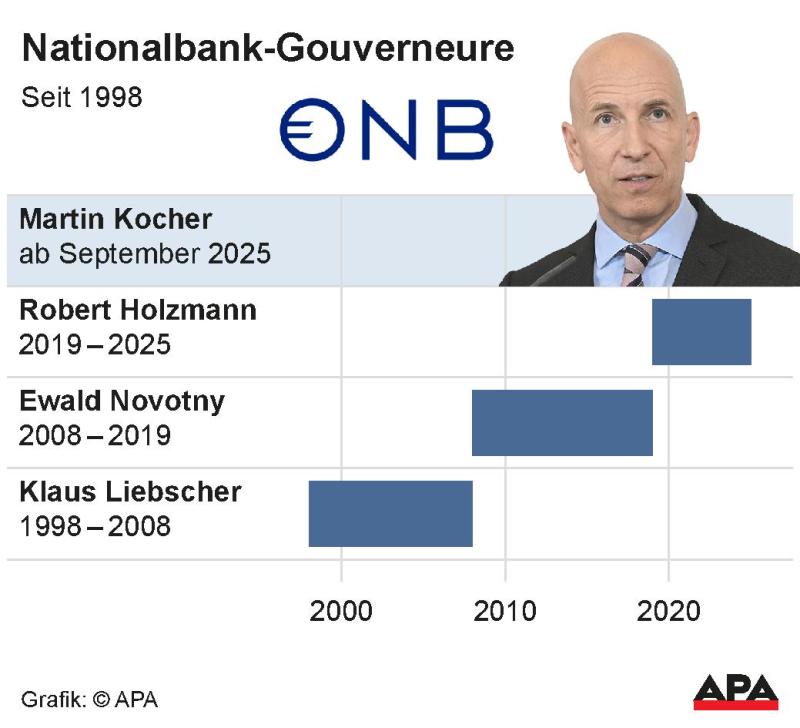Ex-Labor and Economic Affairs Minister Kocher Starts as National Bank Chief

Ex-Minister of Labor and Economic Affairs Martin Kocher, who has now taken over the leadership of the central bank, faces accusations of cronyism. His quick transition from the government to this new position is criticized by the opposition and critics.
National Bank Chief Dream Job for Ex-Minister of Labor and Economic Affairs Kocher
Kocher defends his rapid career path from the government bench to chief central banker. The job as National Bank Governor is (his) dream job, he once said. He himself could not see much merit in the idea of a cooling-off period for government politicians before transitioning to the National Bank (OeNB). He saw no incompatibility between his ministerial office and the position as governor, and argued that the economic policy experience he brought with him was advantageous for the practice there, he once told the APA.

Kocher considers longer mandatory breaks before transitioning in some areas to be reasonable in other areas - for example, in the Constitutional Court, where it should not be the case that "politicians judge laws that they themselves may have been responsible for." In his case, however, there are no such contradictions. In the private sector, two-year cooling-off periods are provided for under the Stock Corporation Act and the Corporate Governance Code. This concerns, for example, transitions from board members to the supervisory board and whether they are allowed to become chairpersons of the supervisory board.
Inflation Problem Now Occupies Kocher as National Bank Chief
Regarding the major issue of the persistently high inflation, there is absolutely no time for "cooling off" for the former Minister of Economic Affairs as the top central banker. Although he cannot directly intervene in prices in his new job, as OeNB chief he sits on the ECB Council, which decides on interest rates, where inflation always plays a role. As a politician, Kocher was very reserved about two years ago when the issue of a price comparison platform arose due to the immense food prices. An official platform for end consumers has not yet been established.
Kurz Brought Kocher into ÖVP-FPÖ Government
Former colleagues describe Kocher as approachable. Critics see him as tending towards neoliberalism. It is not inappropriate that he was brought into the turquoise government team by former ÖVP leader and Chancellor Sebastian Kurz - after his predecessor Christine Aschbacher vacated the position of Minister of Labor due to plagiarism allegations. When former Minister of Economic Affairs Margarete Schramböck left, Kocher also took over her responsibilities. Ultimately, Kocher "survived" Kurz as Chancellor - unlike most of his confidants.
Kocher Always Critical of FPÖ
What the soon-to-be 52-year-old university professor (born on September 13, 1973) always emphasized was that he did not want to be part of a federal government with FPÖ participation. With Holzmann, the business psychologist and behavioral economist is also replacing a governor who joined the central bank on a freedom party ticket. So, from blue, it now becomes black/turquoise, the last red in the job was Ewald Nowotny. The appointment was made before the last national council election by the ÖVP and the Greens.
Kocher was not the most political person for a top politician - even though he was part of three federal governments - Kurz II, Schallenberg, and Nehammer. He also never completely shed the mantle of a scientist as a minister, which was mostly perceived as pleasant by many observers.
More critical voices say Kocher likes to present himself too much as an expert - which he undoubtedly is in several economic areas. In everyday politics, he came across as obliging - without losing sight of the political agenda - yet with some proposals around the topic of work, Kocher still clashed. Directly hitting out at others was not his style.
Central Bank Chief Always Close to a Party
Basically, it is nothing new in Austria that former (finance) ministers later also became central bank chiefs. However, the last time was several decades ago. Whether ÖVP-, SPÖ-, or FPÖ-affiliated - like the now outgoing governor Robert Holzmann - all previous governors have been close to a party. With Maria Schaumayer from 1990-1995, there was also once a woman - in this case ÖVP-affiliated - who reached the top position.
Kocher's Path to Central Bank Chief
Besides running, Kocher always spoke with understatement about his achievements in this area, the married Salzburger also enjoys mountaineering. Kocher studied and habilitated in Innsbruck. With the path to the central bank, a circle closes: As a research group leader before habilitation, Kocher raised third-party funds, among others, from the OeNB. Until his path to the IHS and then politics, Kocher was internationally active as a lecturer, even as far as Australia.
(APA/Red)
This article has been automatically translated, read the original article here.
Du hast einen Hinweis für uns? Oder einen Insider-Tipp, was bei dir in der Gegend gerade passiert? Dann melde dich bei uns, damit wir darüber berichten können.
Wir gehen allen Hinweisen nach, die wir erhalten. Und damit wir schon einen Vorgeschmack und einen guten Überblick bekommen, freuen wir uns über Fotos, Videos oder Texte. Einfach das Formular unten ausfüllen und schon landet dein Tipp bei uns in der Redaktion.
Alternativ kannst du uns direkt über WhatsApp kontaktieren: Zum WhatsApp Chat
Herzlichen Dank für deine Zusendung.


